Student Blog
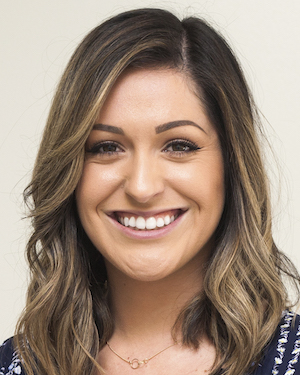
Financing USC: What You Need to Know ⟩
November 16, 2018, by Melissa
As we’ve gotten closer to the application deadline, one of the questions I’ve gotten the most concerns paying for USC and whether the “financial burden” is worth it. Thus, I wanted to take the time to give you guys some insight as to what my thought process looked like when I was applying, and why I feel like coming to USC was the best decision I’ve ever made.
First of all, I want to validate your concerns and let you know that it is completely normal to be intimidated by the cost of tuition at our program. It is more expensive than most programs, and it may feel like a lot to take on. However, I think it’s important that you know what your financing options are before you make a decision. I will admit that to me, it was a bit of a no-brainer. Despite the fact that I was intimidated by the cost of the program, that intimidation was offset by my excitement to be a part of USC Chan. Our program is known to be a leader in the field of occupational therapy, and I truly wanted to be a part of that. In addition, my fears were further ameliorated when I attended an information session and learned more about the aid USC offers, as well as the Federal Loan Forgiveness Program (which I will talk more about below). I was happy to know that I had options, and that made my decision far less daunting, which is why I want to share that information with all of you!
Jessica, a previous Student Ambassador, wrote a “Financing USC” blog series which consists of a couple of blog posts outlining how you can pay for the program. They include information on federal loans available to graduate students and the Loan Forgiveness Program, division scholarships and research assistantships, and student worker positions! Student worker positions are a great way to get involved in the division, and they include the Student Ambassador position that I’m in right now! I also work as a research assistant for one of the many research studies currently being conducted by the division, which is a great opportunity students have available to them as well.
Lastly, I want to talk to you a bit more about the Public Service Loan Forgiveness Program available to students that have taken out federal loans and work in a non-profit setting after they’ve graduated. This program requires that you make 120 payments towards your loans (which is about 10 years), and then waives or “forgives” the remaining balance after you’ve made those payments. Examples of non-profit settings include — but are not limited to — hospitals, some outpatient clinics, and even universities. As OTs, there is a high chance that we may end up working at a site that is considered a non-profit, which means we can qualify for this program! I do want to add that this program only waives federal loans, and not private loans that have been taken out in addition to federal ones.
I highly encourage prospective students to weigh their options before making a decision, and not to let the finances intimidate you from applying/attending USC. After being here for the last year and a half, I truly feel like I made the best decision coming to USC, as the education I’ve received is of the highest caliber. In addition, I have had access to professors and clinicians who are leaders and innovators in the field, which has been instrumental in my own career development. Just know that you have lots of options, and I would be happy to talk to you guys about this further if you have any other questions or concerns!
⋯
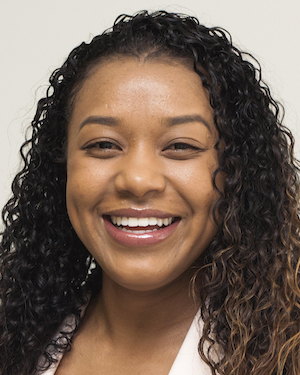
Latino College Expo ⟩
November 15, 2018, by Serena
What a great turn out at this year’s 5th Annual Latino College Expo™!
What is the Latino College Expo?
Mostly comprised of high school and middle school Latino students, the event had recruiters from higher education (like me) and positive post-secondary pursuits (like recruiters from Disney Animation). The event had resources on grants, loans, and the Dream Act; additionally, information on internships and career opportunities were given.
What did I do at the event?
While raising awareness about USC’s OT program with Diego Lopez, an occupational therapy doctorate (OTD) student, we spoke to over 300 high school students and even middle school students, (yes 8th graders :0) about OT. I wish I would have known about OT when I was in 8th grade! It was such an incredible sight to see so many young students not knowing what OT was but then realizing that their unique interests could be found in OT. For example, there were students interested in design and mechanical engineering and they realized that they could become an OT focusing on helping individuals live a more meaningful life by designing more functional prosthetics. Other students with a desire to pursue a major in criminology came to learn about OT’s role in forensic mental health and OT’s ability to work in the criminal justice system.
Given the age of the crowd, the middle and high schoolers were mostly interested in USC’s accelerated Bachelor’s to Master’s in Occupational Therapy program. They were amazed and thrilled to learn that they could receive their Master’s in just 5 years and their doctorate in occupational therapy in just one subsequent year!
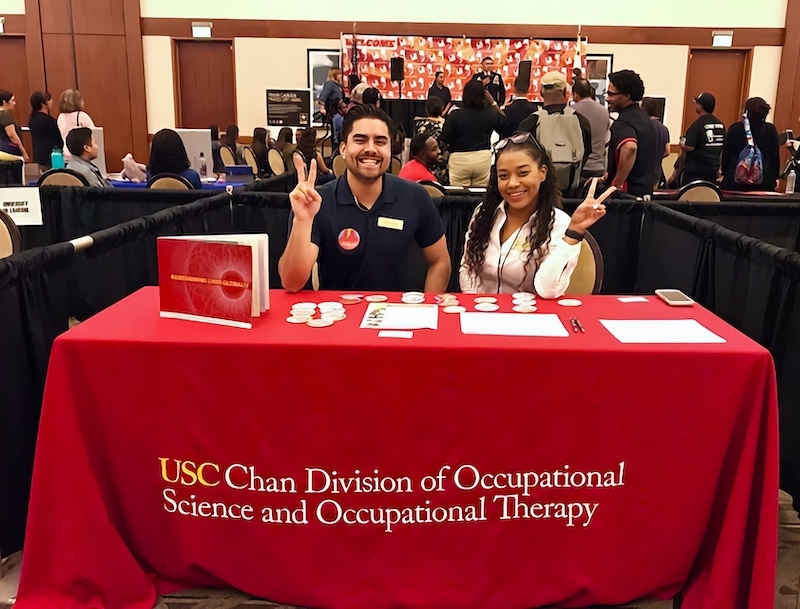
OTD student, Diego Lopez, and I educating high school and middle school students about USC occupational therapy programs at the 5th Annual Latino College Expo event in Pomona, California.
The highlight of the event!
One of the highlights of the event is when the host of the event came up to the USC Occupational Therapy booth and let me have the microphone! I was in utter disbelief. My face completely lit up! I was so surprised since I was the only booth she had given the ability to speak on the microphone in front of the ENTIRE crowd! You know I took full advantage of the opportunity! I politely yet firmly grabbed the microphone and proudly stated my OT elevator pitch with a huge smile on my face. I mean, the opportunity to spread awareness about the best profession in the world 😉 to over 600 people does not happen that often.
In the Future . . .
I am most definitely looking forward to attending the 6th Annual Latino College Expo next year. Maybe next time they will let me go on the main stage with the microphone!
20th Annual Black College Expo
Stay tuned for a post about the 20th Annual Black College Expo, which will take place at the LA Convention Center on February 2nd. If you are a current USC OT student or alumni of the program, please message me if you would like to attend the event and help raise awareness about USC’s OT program!
⋯
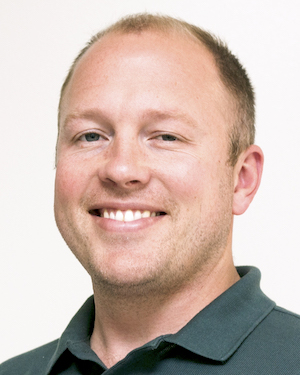
Having a Baby While in Grad School ⟩
November 14, 2018, by Evan
Life Hacks School/Life Balance
The biggest thing going on in my life at the moment is that my wife and I are expecting a baby girl this January. It will be our second (we also have a 2.5-year-old boy) and we are grateful that all signs so far point toward a healthy pregnancy. When sharing this news with my student colleagues, I get mixed responses. Of course, everyone is excited first and foremost. But then for some the excitement melts away into a touch of concern. One classmate last week even went so far to ask, “How are you going to manage it?”
My response is always the same: “Having babies in graduate school doesn’t have to be more difficult than having a baby with a full-time job!” In fact, in some ways it may even be easier. Let me explain:
USC CHAN OFFERS AN INCREDIBLY SUPPORTIVE ENVIRONMENT — most of my teachers have families of their own and have been very supportive about my journey into the occupational role of being a parent. Even though I am a male and not physically carrying a child, they recognize the importance of my presence and involvement during the critical moments of pregnancy, the birthing process, and early childhood. It’s wonderful to know that I will always be able to be there for my family without incurring unreasonable academic penalty.
THERE ARE OPTIONS — while I am electing not to take time off school, it was made clear to me from the beginning that it was an option. Students in the past have chosen to take a semester off class, or delayed a level II fieldwork, and then were able to pick back up right where they left off several months down the road. This is also true with regard to my student job. I am so grateful that my supervisor has given me some flexibility on hours during the month of birth.
BALANCE CAN BE ACHIEVED — of course grad school is academically rigorous, but I honestly find my live-work balance to be healthier now than it was during the years working a full-time job in the film business. Most days I get home between 5-6pm and have the opportunity to eat dinner, give baths, and put my son to bed. This simply would not have been possible in my old job. People always ask when I have time for schoolwork — let me tell you there’s plenty of time after bedtime for homework, especially when you can’t really leave the house!
So for me, having a baby in grad school is doable, and even preferable to trying to manage it while working full-time at my previous job. If anyone out there is hesitant about OT school because they are ready to start a family, I’d encourage them to not feel held back by those fears. Rest assured those feelings are normal — I had them too — but I’m here to tell you it’s possible to earn a master’s degree with a young family. (And even have fun in the process!)
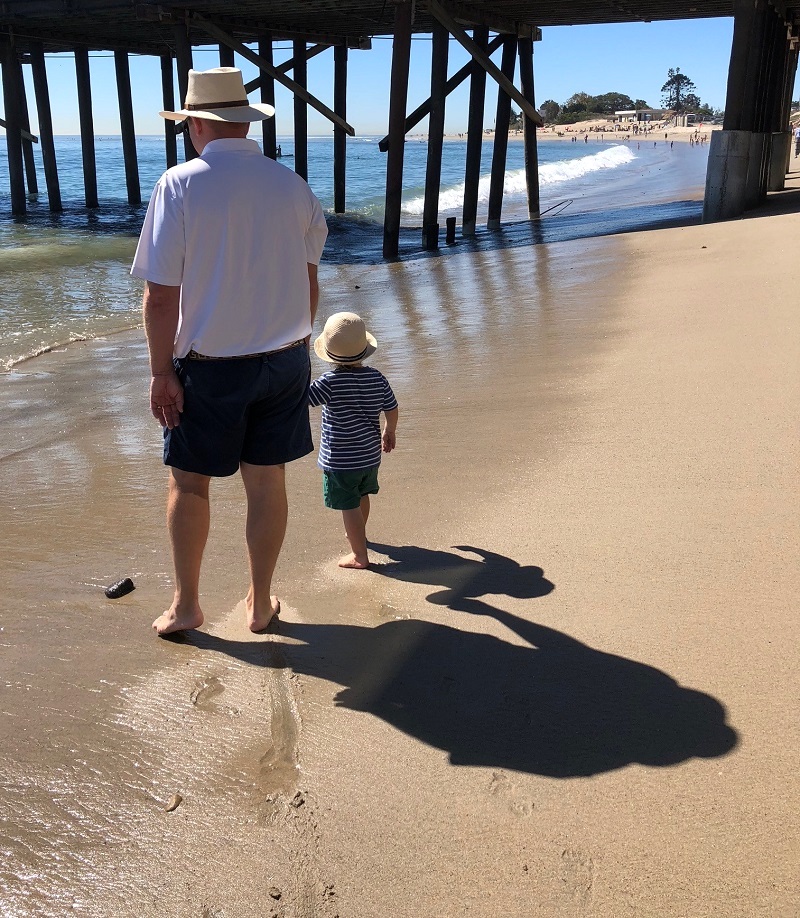
⋯

Infusing Yoga into Fieldwork ⟩
November 12, 2018, by Serena
I am completing my Level I Fieldwork and Jennifer is completing her Level II Fieldwork at the USC Kortschak Center for Learning and Creativity (KCLC) under the mentorship of a previous student ambassador, Dr. Rashelle Nagata. As mentioned in my previous post, the USC KCLC is an academic support center that addresses challenges related to academic performance such as time management techniques, procrastination, self-care strategies, and stress management skills.
Dr. Nagata is our wonderful Fieldwork Educator (FE). A FE, formerly known as a Clinical Instructor (CI), is typically an occupational therapist who mentors and supervises you during your FW experience. In the beginning of our FW, Jennifer and I worked together to build an occupational therapy informed yoga class that incorporated meditation, mindfulness, and gentle yoga stretches to provide a greater awareness of useful calming and alerting strategies that can be easily incorporated throughout the day.
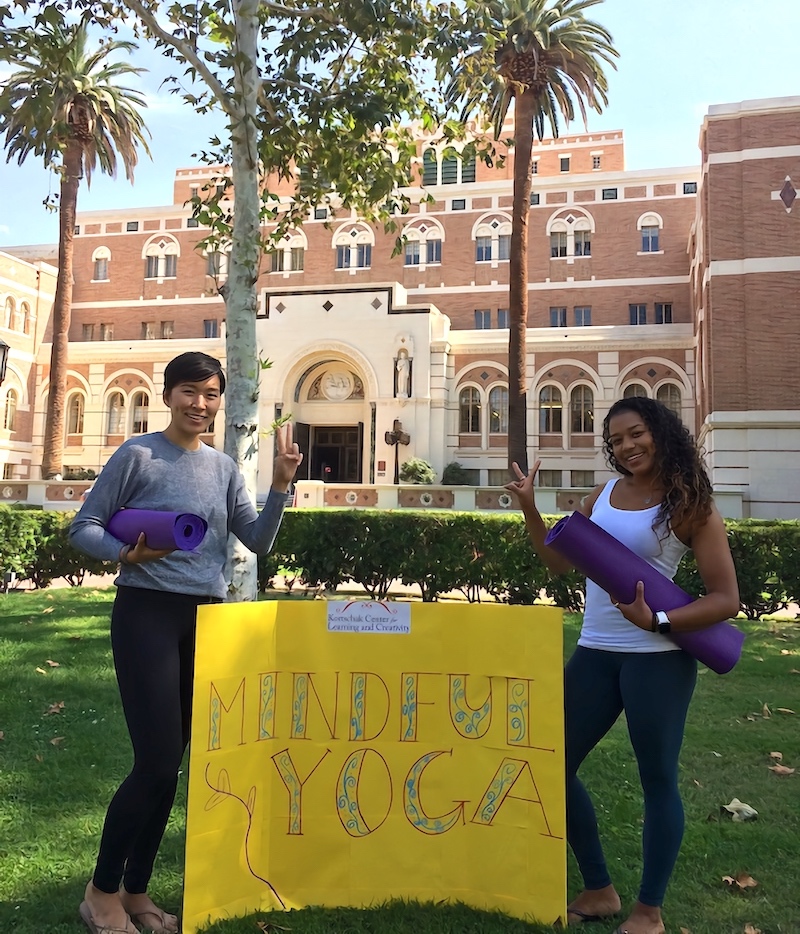
The yoga sessions, which are trauma informed, first begin with a mindful breathing activity, then leads into a guided meditation, and ends with gentle yoga stretches and poses. Throughout the session, aromatherapy and bells or Tibetan sound bowls are incorporated during session to bring greater awareness to the power of senses impacting a calm and alerting state. For example, we pass around lavender in the beginning to elicit a more serene vibe. Towards the end of the session, peppermint oil is offered to those wishing to return to an environment that requires a more alert state of being. We end with the sound of bells or Tibetan bowls, which have healing benefits such as decreasing stress and anxiety.
Namaste.
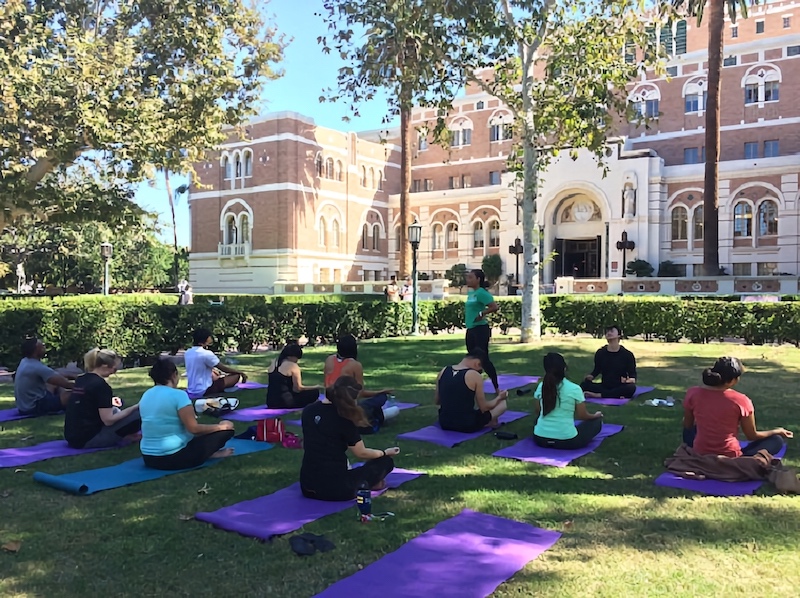
The yoga group comprised of undergraduate, graduate, staff, and faculty members performing gentle yoga stretches in front of Doheny Library on a beautiful sunny Southern California day!
⋯
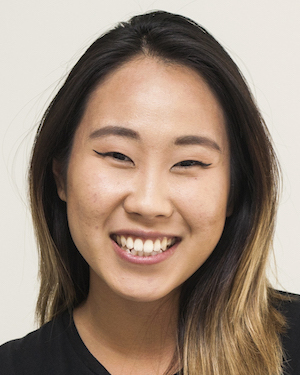
Can I Work In Grad School? ⟩
November 8, 2018, by Joyce
My answer to you would be that it depends. I know, everyone’s favorite answer to hear. However, I say it depends because it truly is dependent on the kind of learner you are and how efficient you are in managing your time.
In the beginning of the program (summer session) I chose not to work because of the intensity of the program (M-F 8AM-4PM). In addition to the academic and coursework, I was also couch hopping because I literally picked up my entire life and moved across the country. There was a lot of instability and uncertainty during that summer and if I were to add that extra dimension of work, I knew it would take a physical, mental, and emotional toll.
Thankfully I survived the summer program and in the fall semester, I began my Adult Rehabilitation Immersion. Each practice immersion varies but the Adult Rehabilitation one is known for its intense studies in various medical diagnoses and conditions. Therefore, I decided that this semester would not be the best semester to start working because I would much rather absorb and obtain this information to the best of my abilities without any other distractions. Not working and taking out additional loans opened up space in my schedule to read my notes and study a few extra hours.
It was when I began the Mental Health Immersion that I felt that there was enough room and space in my life to add a part time job. Therefore, I began to work as a hostess at a Korean BBQ restaurant. My shifts required me to be in on the weekends. I had a great time, it was nice to be involved in something non-OT related. Don’t get me wrong, I love the profession and I love the people that I interact with but working at a restaurant brings about a different kind of aura. I met many international travelers (as our restaurant is rated 4.5 stars on yelp and highly popular amongst tourists!). I enjoyed the customer service aspect and even casually conversing with people as they walked in and out of the restaurant.
I came home pooped from standing all day but it was nice to be able to make some money and use a different set of skills. So to answer your question, yes it is possible to work while you study. But in the midst of it, remember that you are still a student first and that your academics takes priority. Something that I have learned to do is weighing the pros and cons of the situation. Is it worth losing three hours of sleep every night to work a few hours and do homework to earn maybe $50? I guess it would depend on the kind of part time job you decide to pick up as well. I have classmates who babysit for higher rates for shorter times and others who work longer shifts in the food industry but making most of their income on tip.
So, is it doable? Yes, but it depends.
⋯





